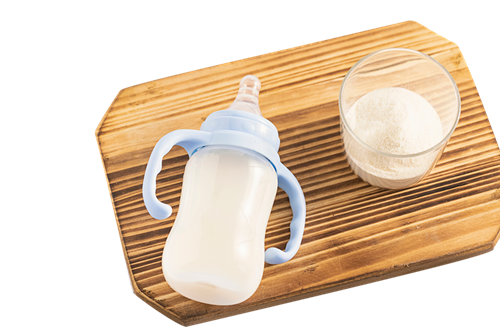It’s specified in Article 8 of the Administrative Measures for the Registration of Infant Formula Products that the applicant shall possess proper R&D capabilities aligned with its products. When applying for registration of infant formula milk powder products, the applicant shall submit 9 required documents to the State Administration for Market Regulation (SAMR), including 8) Materials on R&D, production, and inspection capabilities. Additionally, the review agency may organize on-site inspections as necessary for verification to ensure the consistency between the application materials and the actual circumstances.

CIRS Group provides a comprehensive analysis of the detailed requirements for preparing R&D capabilities-related materials for registration under the new national standard.
Companies with products already on the market
If the applicant is a manufacturer of products already on the market (i.e., a company whose product formulas have already been approved), only simplified documentation is required under the section 80 “Proof of Research and Development Capability”. It falls into two specific types:
Types | Materials required |
Domestic manufacturer of infant formula milk powder with food production permit | Copy of food production permit (including original and duplicate copies, along with details of product varieties) |
Overseas manufacturer of infant formula milk powder with certificate of import registration | Copy of certificate of import registration |
New applicants
For new applicants, all of the following materials shall be submitted without omission:
1. Basis for determining product nutrient design values and/or label values
Describe the R&D process, including the rationale and methodology used to establish the nutrient design values and label values of the product.
2. Research on nutritional data of raw materials
- Provide inspection reports of at least one batch for bulk raw materials such as protein, fat, and carbohydrates (including base powder, lactose, milk powder, whey powder, whey protein powder, raw milk, vegetable oil), covering items that meet the requirements of quality and safety standards for raw materials. In addition, the inspection items for base powder should also cover the requirements specified in relevant national food safety standards for infant formula milk powder. If base powder is used, provide the test report for base powder, and those for base powder ingredients are not required;
- Provide data on the content of essential nutrients and optional components labeled on the final product’s nutrition facts, derived from bulk raw materials (at least three batches), along with statistical analysis of variability coefficients and control measures. For nutrients without content data, such as water-soluble vitamins in vegetable oil, provide sufficient reasoning. If the base powder is used, baseline data for the base powder should be provided and those for base powder ingredients is not required; and
- Test reports and baseline content data should be conducted by the applicant or entrusted by a qualified third-party inspection agency.
3. Study on nutrient degradation during production
- The study should involve three batches of the formula product produced under typical commercial conditions;
- Research content should cover degradation studies for key nutrients including fats and fatty acids (e.g., linoleic acid, DHA, AA), water-soluble vitamins (e.g., VC, B1, B2, B12, folate, choline), fat-soluble vitamins (e.g., VE, VA), and minerals (e.g., copper, zinc, iron, selenium, iodine), tailored to various processing methods; and
- Research data should be obtained through self-inspection or commissioned from a qualified third-party inspection agency. If entrusted, the client should be the applicant for formula registration.
4. Study on nutrient degradation during shelf life
In principle, conduct shelf life degradation studies according to the Guidelines for Stability Studies of Infant Formula Milk Powder Products (Trial).
5. Study on deviation range of nutrient design values and/or label values testing
Calculations of the deviation between nutrient design values, label values, and detected values shall be submitted, followed by an analysis and study of the resulting ranges.
6. Basis for formula composition selection and design values of use levels
Outline the R&D process, provide the basis for selecting formula composition (food raw materials and food additives), and detail the process of designing nutrient content.
7. Formula validation and correction process and results
8. Determination of product internal control standards
Provide principles, basis, and calculation processes within the company to establish internal control standards for product quality requirements.
On-site inspection requirements
- Establish an independent R&D institution equipped with dedicated R&D personnel, including individuals with advanced professional titles or relevant expertise in food and nutrition, along with corresponding qualifications. The qualifications, capabilities, and quantity of personnel should align with the requirements of product R&D;
- Ensure places, equipment and facilities are suitable for R&D;
- Specify the responsibilities for R&D institutions;
- The production unit possesses technical capabilities for production process adjustments and risk control; and
- Possess corresponding R&D management systems and documents, with clearly defined responsibilities that are strictly adhered to.
R&D capabilities sharing
If an enterprise has an independent research institution, the holding subsidiary company, as the applicant, can leverage certain research capabilities within the group.
Further information
- Strategies for Enterprises in Response to New Infant Formula Registration Regulations in China
- 【Infant Formula Milk Powder】Key Technical Points for Registration under the New National Standard in China - Base Powder
- 【Infant Formula Milk Powder】Key Technical Points for Registration under the New National Standard in China - Hydrolyzed Milk Protein
- 【Infant Formula Milk Powder】Key Technical Points for Registration under the New National Standard in China -Probiotics
- 【Infant Formula Milk Powder】Key Technical Points for Registration under the New National Standard in China - Production Capacity
If you need any assistance or have any questions, please get in touch with us via service@cirs-group.com.

